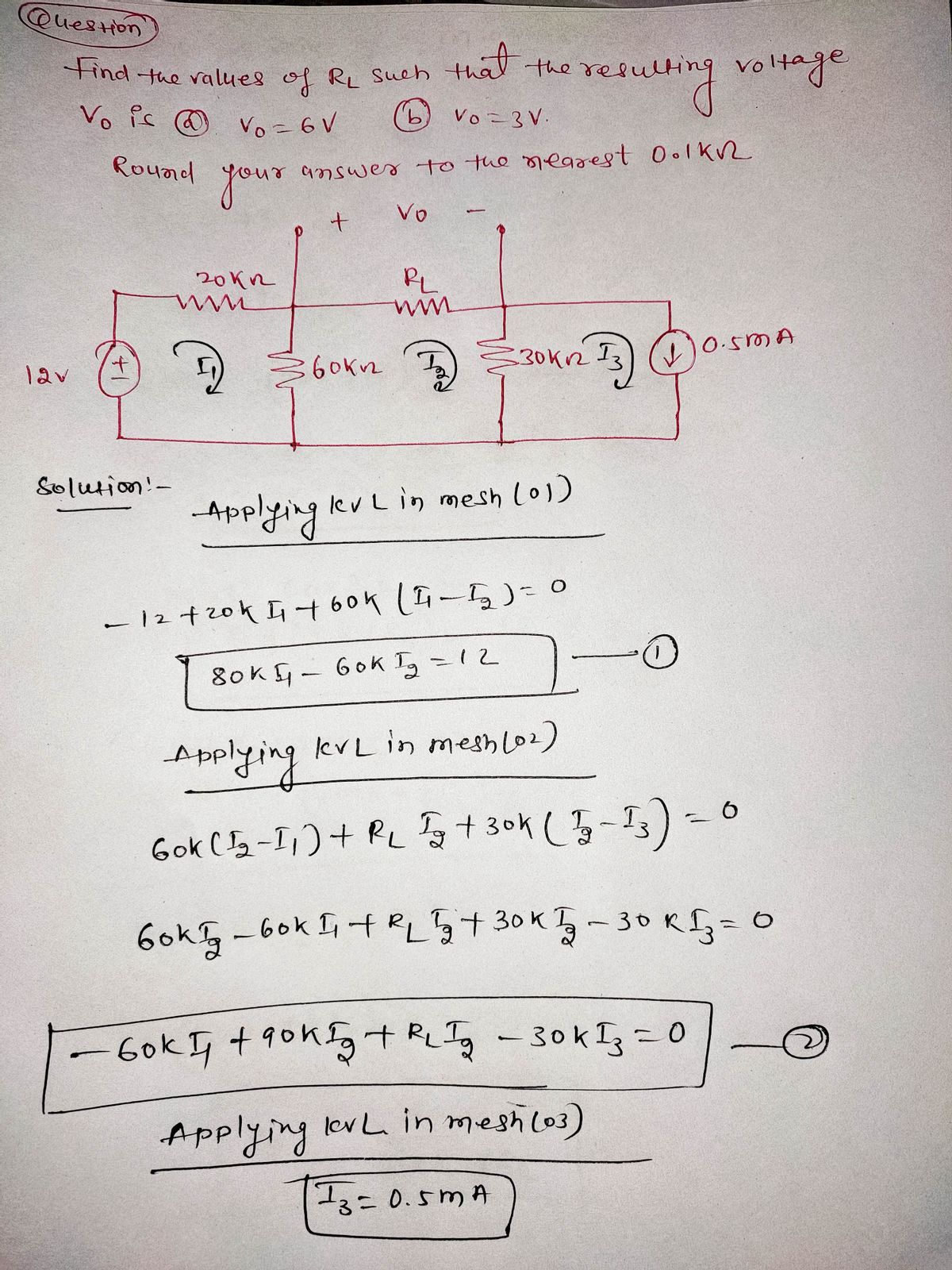**Problem Statement:** Find the values of \( R_L \) such that the resulting voltage \( V_0 \) is (a) \( V_0 = 6 \, V \) and (b) \( V_0 = 3 \, V \). Round your answer to the nearest 0.1 k\(\Omega\). **Circuit Diagram Explanation:** The circuit consists of: - A voltage source of 12 V connected in series with a 20 k\(\Omega\) resistor. - A parallel combination of three branches: - The first branch has a 60 k\(\Omega\) resistor. - The second branch has a resistor labeled \( R_L \). - The third branch has a 30 k\(\Omega\) resistor in series with a 0.5 mA current source. The voltage across the parallel combination is labeled \( V_0 \). The task is to determine the resistance \( R_L \) that makes \( V_0 \) equal to 6 V and 3 V in two separate scenarios.
**Problem Statement:** Find the values of \( R_L \) such that the resulting voltage \( V_0 \) is (a) \( V_0 = 6 \, V \) and (b) \( V_0 = 3 \, V \). Round your answer to the nearest 0.1 k\(\Omega\). **Circuit Diagram Explanation:** The circuit consists of: - A voltage source of 12 V connected in series with a 20 k\(\Omega\) resistor. - A parallel combination of three branches: - The first branch has a 60 k\(\Omega\) resistor. - The second branch has a resistor labeled \( R_L \). - The third branch has a 30 k\(\Omega\) resistor in series with a 0.5 mA current source. The voltage across the parallel combination is labeled \( V_0 \). The task is to determine the resistance \( R_L \) that makes \( V_0 \) equal to 6 V and 3 V in two separate scenarios.
Introductory Circuit Analysis (13th Edition)
13th Edition
ISBN:9780133923605
Author:Robert L. Boylestad
Publisher:Robert L. Boylestad
Chapter1: Introduction
Section: Chapter Questions
Problem 1P: Visit your local library (at school or home) and describe the extent to which it provides literature...
Related questions
Question

Transcribed Image Text:**Problem Statement:**
Find the values of \( R_L \) such that the resulting voltage \( V_0 \) is (a) \( V_0 = 6 \, V \) and (b) \( V_0 = 3 \, V \). Round your answer to the nearest 0.1 k\(\Omega\).
**Circuit Diagram Explanation:**
The circuit consists of:
- A voltage source of 12 V connected in series with a 20 k\(\Omega\) resistor.
- A parallel combination of three branches:
- The first branch has a 60 k\(\Omega\) resistor.
- The second branch has a resistor labeled \( R_L \).
- The third branch has a 30 k\(\Omega\) resistor in series with a 0.5 mA current source.
The voltage across the parallel combination is labeled \( V_0 \). The task is to determine the resistance \( R_L \) that makes \( V_0 \) equal to 6 V and 3 V in two separate scenarios.
Expert Solution
Step 1

Step by step
Solved in 4 steps with 4 images

Recommended textbooks for you

Introductory Circuit Analysis (13th Edition)
Electrical Engineering
ISBN:
9780133923605
Author:
Robert L. Boylestad
Publisher:
PEARSON

Delmar's Standard Textbook Of Electricity
Electrical Engineering
ISBN:
9781337900348
Author:
Stephen L. Herman
Publisher:
Cengage Learning

Programmable Logic Controllers
Electrical Engineering
ISBN:
9780073373843
Author:
Frank D. Petruzella
Publisher:
McGraw-Hill Education

Introductory Circuit Analysis (13th Edition)
Electrical Engineering
ISBN:
9780133923605
Author:
Robert L. Boylestad
Publisher:
PEARSON

Delmar's Standard Textbook Of Electricity
Electrical Engineering
ISBN:
9781337900348
Author:
Stephen L. Herman
Publisher:
Cengage Learning

Programmable Logic Controllers
Electrical Engineering
ISBN:
9780073373843
Author:
Frank D. Petruzella
Publisher:
McGraw-Hill Education

Fundamentals of Electric Circuits
Electrical Engineering
ISBN:
9780078028229
Author:
Charles K Alexander, Matthew Sadiku
Publisher:
McGraw-Hill Education

Electric Circuits. (11th Edition)
Electrical Engineering
ISBN:
9780134746968
Author:
James W. Nilsson, Susan Riedel
Publisher:
PEARSON

Engineering Electromagnetics
Electrical Engineering
ISBN:
9780078028151
Author:
Hayt, William H. (william Hart), Jr, BUCK, John A.
Publisher:
Mcgraw-hill Education,